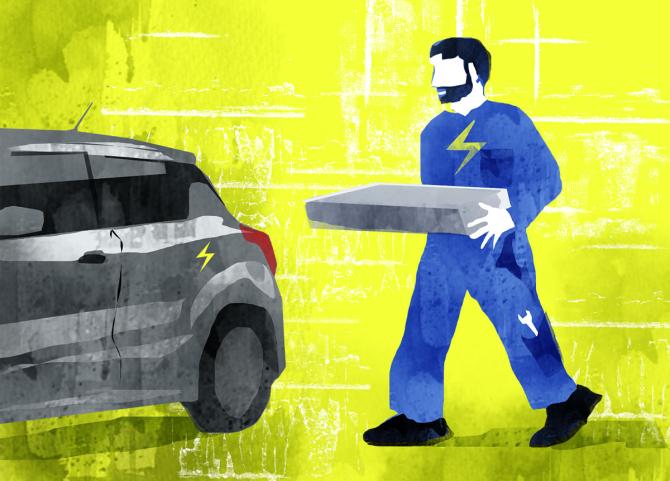As much as 35 per cent to 40 per cent of all vehicles sold in the country across segments will be electric by 2030, up from a mere 2 per cent this year, says a Bain & Co report released today.

This translates to 14-16 million new electric vehicles (EVs) selling in a year.
The inflexion point, which is now being seen month on month in many segments (such as two-wheelers which hit around 4-5 per cent in December), will be more than visible in 2026, when 4-5 million EVs across segments are expected to be sold, accounting for 15-20 per cent of the total sales, says the report.
What’s more, the projected level of penetration, according to Bain, will lead to a new EV-specific revenue pool of anything between $76 billion and $100 billion by FY 2030.
(This includes some double counting in the value chain from the cost of batteries and other components).
Four-wheelers are projected to have a 41 per cent share in the revenue pool, followed by two-wheelers at 33 per cent, and the rest from all other segments.
Potentially, this would translate to an $8 billion–$11 billion participant profit pool, with passenger vehicles comprising the largest segment by value, despite seeing relatively lower penetration and volumes.
They would be followed closely by two-wheelers.
Bain estimates that electric two-wheelers, which will account for 2 per cent of the total sales in the segment 2022, will go up to 20 per cent in 2026, and hit 40-45 per cent by 2030.
Electric passenger cars, currently led by Tata Motors, which now accounts for less than 1 per cent of the market, will see a substantial uptick in 2026 to around 7-10 per cent, going on to capture 15 per cent to 20 per cent of the overall car market by 2030, the report says.
In the commercial vehicles segment, light commercial vehicles (LCVs) and buses (the sales of buses are primarily dependent on orders from the government and state transport corporations) will also see a reasonable conversion to electric.
Bain estimates that there will be a 20-25 per cent conversion in LCVs and 15-20 per cent in buses by 2030.
However, the medium and heavy commercial vehicle space will remain a laggard, with traditional internal combustion engine (ICE) continuing to dominate.
There will be a mere 2-5 per cent conversion to EVs in this segment, the report says.
However, not everyone agrees with Bain’s projected speed of conversion to electric.
For example, Ola’s Bhavish Aggarwal believes that at least 80 per cent to 100 per cent of the two-wheeler market will shift to electric in the next three years.
The near inevitability of the auto sector going electric is reflected in the growing interest of top private equity and venture capital entities in investing in the sector.
Between 2019 and 2022, they have invested $3.7 billion in the space, with the bulk (82 per cent) going to auto original equipment manufacturers (OEMs).
The Tatas, pursuing an aggressive electric strategy, are on the top of the list, having garnered $1 billion in such investments.
They are followed by Ola Electric ($860 million), which has the backing of Softbank.
The others are a bit behind in the game, with Mahindra & Mahindra having got $240 million in funding, and two-wheeler startup Ather Energy mopping up $230 million.











